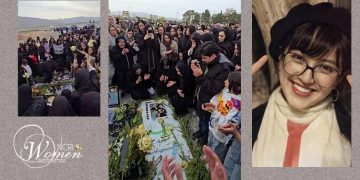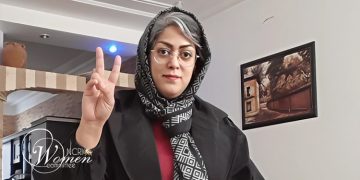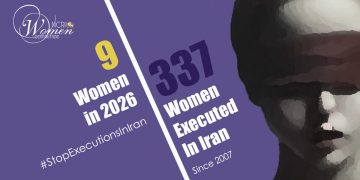From the memoir by Hengameh Haj Hassan – Part Five
Face to Face with the Beast- Content Warning: This section includes graphic descriptions of physical torture, child endangerment, and the psychological abuse of political prisoners. Reader discretion is advised.
In Part Four of Face to Face with the Beast, Hengameh Haj Hassan—a nurse at Sina Hospital in Tehran during the early 1980s—recalled the mental torture she endured in the Khomeini regime’s prison. We met two of her fellow prisoners, Mahnaz and Tahmineh, both of whom were enduring unbearable physical abuse and still managed to protect others. In this part, Hengameh shares the story of a heroic couple and their extraordinary resistance under torture.
A Heroic Couple
One day, as we sat quietly in our cell, the door opened and a tall woman was shoved inside. She was wearing one of those thin hospital gowns, and instead of a headscarf, a small towel was draped over her head, hanging down both sides of her pale, drained face. She looked exhausted and unwell. We rushed to help her sit down.
As she lowered herself, the towel fell back slightly, revealing a beautiful, youthful face, framed by light hazel eyes and a high forehead. But her mouth—her mouth was badly wounded, infected, and to put it bluntly, torn apart. She couldn’t speak. Yet she tried to smile shyly with her dim, weary eyes, responding to our welcome and thanking us without a word.
We wrapped her in warm clothes and prepared sugar water for her—she couldn’t chew or eat anything, and we had nothing else to offer anyway. Once she had rested a bit, we introduced ourselves and told her that we were in prison for supporting the Mojahedin (PMOI), Iran’s most prominent opposition group at the time.
It was our unspoken rule in prison to say only as much as necessary—enough to orient the newcomer, but never enough to endanger anyone. The regime had planted spies and informants among us, often prisoners who had broken under torture and were now reporting to interrogators. We always assumed we were being watched and guarded our words. But even with these precautions, we found a way to pass on what needed to be known.

Her name was Afsaneh Afzalnia, and her husband was Abbas Pishdadian. Both were students at the University of Tehran. If I remember correctly, Afsaneh studied social sciences, and they had a six-month-old baby girl named Fatemeh. The couple had been recognized on the street by regime forces on Mosaddegh Avenue. When they resisted arrest, they were severely beaten and injured, taken to a hospital for a few days, and then transferred to Evin Prison for interrogation and torture.
Afsaneh was extremely weak. She could barely consume anything, and her mouth wounds made even water painful. We begged the guards for milk or soft food, but they ignored us. We gave her sugar water and whatever liquids we could extract from our own rations—anything that wasn’t rice. Even that burned her wounds, and she could only manage a few sips at a time.
Despite her condition, they continued to take her for interrogations. She told us they were demanding the address of a house in Tajrish—one she genuinely didn’t know. She repeated this to us deliberately, hoping that somehow word would reach the organization: the house in Tajrish had not been compromised, but might soon be—so it should be evacuated.
One day she returned from interrogation visibly shaken, yet somehow still composed. Tears welled in her eyes as she spoke:
“They’re monsters. They took me to where my husband was. I didn’t recognize him—his body was drenched in blood. I don’t know what they did to him… his hands, fingers, feet, face, mouth—everything was broken and covered in blood. The interrogator said, ‘This is your husband. If you want him to live, talk. Give us the Tajrish address.’”
Her husband—her heroic husband—had told them nothing. All he could do was open his bloodied eyes and, in a silent, unbroken gaze, reassure Afsaneh that he hadn’t talked—that they hadn’t broken him. Afsaneh turned to the interrogator and said calmly:
“I have no address to give you.”
The interrogator slapped her hard across the face, screaming,
“You emotionless hypocrite!”
Another time, she came back from an interrogation and, as soon as the door closed behind her, collapsed against the wall. With unimaginable grief in her voice, she said,
“They put my six-month-old daughter, Fatemeh, in the hallway in front of me. She hasn’t had milk for six days. She’s been separated from me all this time.”
Her voice cracked as she continued,
“She can’t even cry anymore. She just lets out faint little whimpers and falls silent again. They put her there on purpose—to break me. To use my maternal instincts to make me betray the cause. But I won’t. Even if it costs me my child’s life, I will not give in.”
At that moment, her eyelids could no longer contain her tears. They poured silently, relentlessly, down her pale cheeks.
Afsaneh Afzalnia—the brave, unshakable Afsaneh—was executed by firing squad 20 days after her arrest. She never said a single word to help the regime. The interrogators never even realized that she was one of the PMOI’s key members. If they had, they wouldn’t have executed her so quickly. They thought they were killing a nobody. Instead, they killed a symbol of defiance.
























